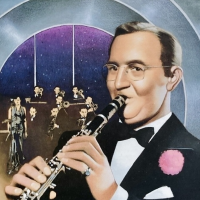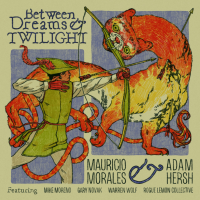Home » Jazz Musicians » Ray Anthony
Ray Anthony
Ray Anthony has been one of Big Band music's most dedicated ambassadors. For sixty years he has helped keep alive the sounds of America's golden age of jazz and pop music. Born in 1922, Anthony began his musical career at age five, playing in his family's group, the Antonini Family Orchestra. During high school he worked with local bands in the Cleveland, Ohio, area and later made his professional debut with Al Donahue in 1940. After only a short time with Donahue, Anthony was hired by Glenn Miller but left after six months, unable to get along with the famous orchestra leader. He then played briefly with Jimmy Dorsey before forming his own group, which featured unique instrumentation -- one trumpet, one French horn, five saxes, and three rhythm. In 1942 he entering the Navy, where he led a service group in the Pacific. Upon being discharged in 1946 he formed a new orchestra, signing with Capitol Records. When Ralph Flanagan began the parade of Glenn Miller imitation bands Anthony fell in line and, like other imitators, made good money. During the 1950s he had a string of hits, including "Peter Gunn," "The Bunny Hop," "Harbor Lights," and a jazzed-up version of the Dragnet theme song. He also appeared in several movies during that decade, such as This Could Be the Night and the Fred Astaire vehicle Daddy Long Legs. Ray Anthony’s Harry James style trumpet and arrangements were mainly aimed at a more commercial oriented crowd rather than jazz fans. However a few of his late 50’s releases show the swinging side of Ray Anthony. Several noted here contain recordings far removed from his usual commercial fare. Anthony was raised in Cleveland, Ohio and was one of six brothers. He started on the trumpet at the age of 5. In 1938 he joined Al Donahue and then worked for Glenn Miller from November of 1940 to July of 1941. He then spent six months with Jimmy Dorsey before he joined the Navy in 1942, leading his own band in the Pacific until 1946. Anthony started leading a civilian band under his own name in 1946, achieving popularity in 1949 after he joined Capitol Records. One of his biggest “hits” was the theme to “Dragnet” which he recorded in 1953. Although much of Anthony’s output is considered commercial (or as Down Beat magazine in the 40’s would have called it “corn”) he has cut several records that swing heartily.
Read moreTags
Ray Anthony & His Orchestra: The Navy Show Broadcasts

by Jack Bowers
Trumpeter Ray Anthony, a bandleader for more than half a century, led his first ensemble for the U.S. Navy during World War II, and performed a number of times on behalf of the Navy recruiting service from 1946–54, broadcasts from which the selections on this disc were taken. This is exclusively standard fare designed for dancing, some of which sounds quite dated (“Wheel of Fortune,” “Bermuda,” “Blacksmith’s Blues,” for example). Solos are entrusted almost exclusively to the leader’s emphatic trumpet ...
Continue ReadingRay Anthony: The Early Years

by Jack Bowers
The Early Years encompasses three sessions by trumpeter Ray Anthony’s dance–oriented orchestras. The plural is used because the first of these bands, which Anthony led for a time, was the U.S. Navy’s “Dolphins,” based first in Hawaii and later, at the end of World War II, on Okinawa. Tracks 1–10, by the Navy band, were recorded at the Royal Hawaiian Hotel in Honolulu in 1945; tracks 11–14 were recorded by Anthony’s post–war band at New York’s Roseland Ballroom in 1946, ...
Continue ReadingRay Anthony: Big Band Story

Source:
JazzWax by Marc Myers
In 1963, bandleader and trumpeter Ray Anthony hosted a TV show from Hollywood called The Ray Anthony Show. In the following six-part video series, Anthony pays tribute to the swing bands of the late 1930s and '40s. What's fascinating about this showcase is that you get to see how the bands voiced their individual sounds as well as the crack musicians in Anthony's all-star band, many of whom take solos. We also get to see arranger Jerry Gray, Ann Richards, ...
read more


























